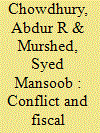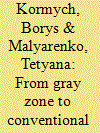| Srl | Item |
| 1 |
ID:
146501


|
|
|
|
|
| Summary/Abstract |
We examine the role of war in retarding state fiscal capacity in developing countries, measured by tax revenue ratios to GDP. We build a simple theoretical model of a factionalized state, where patronage substitutes for common interest public goods, along with violent contestation over a rent or prize. Our dynamic panel empirical analysis applied to 79 developing countries, during 1980–2010, indicates that war, especially civil war, retards fiscal capacity, along with imperfect democracy, political repression, poor governance, and dependence on oil and macroeconomic mismanagement. High intensity conflict is particularly destructive of state capacity. In countries experiencing low intensity wars, other institutional factors may matter more than war. The diminution of fiscal capacity due to war appears less pronounced after the end of the cold war.
|
|
|
|
|
|
|
|
|
|
|
|
|
|
|
|
| 2 |
ID:
192654


|
|
|
|
|
| Summary/Abstract |
A gray zone conflict that emerged after the Russian annexation of Crimea was an element of the Russian strategy of establishing and consolidating a new and more favourable internationally recognized maritime order in the Black Sea, Kerch Strait, and the Sea of Azov. Empirical data shows that Russian superiority over Ukraine and inferiority vis-a-vis the West shaped a double asymmetry of its tactics of projecting power against Ukraine while avoiding confrontation with the West. Eventually, Moscow reached a point where the gray zone tactics could not secure its objectives. The Russian invasion of Ukraine in February 2022 signalled the exhausting coercive potential of a gray zone conflict. Although, despite of transition to conventional warfare, we found continuity of ‘gray zone’ tactics of double asymmetry and denying responsibility in the Russian playbook. Hence, a possible de-escalation of the Russia – Ukraine war may likely return to a gray zone conflict.
|
|
|
|
|
|
|
|
|
|
|
|
|
|
|
|